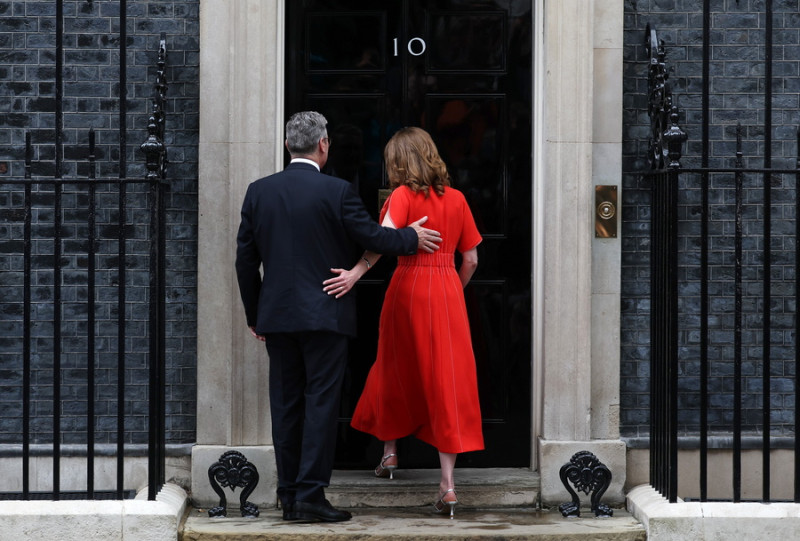Starmer’s Labor will lead the country for the first time since 2010, after 14 years of Conservative governments and a string of crises
(Re)born and rechristened by the 4th of July triumph… The talk of the once-in-his-own-party Keir Starmer, who has a popular mandate to “turn it all around” after long Tory rule that was frowned upon echoed by public opinion.
Starmer’s Labor will lead the country for the first time since 2010, after 14 years of Conservative governments and a chain of crises: austerity, Brexit, soaring prices and even a “waltz” of prime ministerial changes.
Leaving Buckingham Palace, where he was commissioned by King Charles, the 61-year-old former barrister delivered his first speech as prime minister in front of the door of No 10 Downing Street. He said Britain needed to rediscover its identity and embark on a broader reboot, in his first remarks outside his new office at No 10 Downing Street, pledging to try to restore trust in politics and serve all voters.
“Change begins now,” he declared, reiterating his commitment to “national renewal.”
Starmer’s duties begin immediately. Among the first meetings is next week’s NATO 75th anniversary summit in Washington.
The Conservative Party recorded its worst result of the 20th century: 121 MPs, compared to 365 five years ago in the election led by Boris Johnson. Tory leaders were swept up in the wave of rejection. Among them are former Prime Minister Liz Truss, Defense Secretary Grant Shapps and Parliamentary Relations Officer Penny Mordant, who is seen as a possible future Tory leader.
This Starmer sees and knows: the suspicious British are waiting for him around the corner. He knows that the British people will not offer him a ‘honeymoon’.
Throughout the election campaign, Starmer promised the return of “stability” and “seriousness”, with very strict management of public spending.
Careful and methodical
Strategy is very much a hallmark of Starmer, who entered politics in his 50s from a career characterized by a careful and methodical approach, based on competence and pragmatism rather than driven by a dominant ideology.
He took his first name from the first leader of the Labor Party, Keir Hardy, and grew up in a home with a left-wing family. As a lawyer, he often defended the marginalized and worked to overturn the imposition of death sentences on people around the world.
From a human rights lawyer from a small town in the south of England, he is now the Prime Minister of the United Kingdom. Yet Britain barely knows who he is.
He became a Labor MP in 2015, a year after receiving a knighthood for services to the law and criminal justice, and was elected Labor leader in 2020 after the party’s worst election performance since 1935.
He implemented a plan to bring the party around his priorities, with one person who worked with Starmer saying: “He’s thinking about the best way to get people with him.” This approach led to his being labeled as boring.
He spent much of the election campaign listening to voters’ concerns about health care, education and the cost of living, promising simply to try to make life for Britons a little better – over time.
Starmer has been a politician for just nine years and since being crowned UK Labor leader in 2020, he has led his party from its worst election defeat in nearly a century to a dominant force in British politics.
More than that, his success – at a time when Western allies are flirting with populism – positions him as one of the few centrist leaders in the world.
Few thought such a transformation possible. His enemies say his victory was due to luck: that he benefited from the Tories’ disastrous run and that he won without an opponent. But the truth is more complicated.
At 61, Starmer has a long history. His father was a silent, domineering toolmaker and his mother was a nurse, with the debilitating Steele’s disease. He got his first name from the first leader of the Labor Party, Keir Hardy.
He excelled in school. He played flute and football and became a lawyer. His brothers called him “Superboy”.
Starmer inherited from Jeremy Corbyn’s 2019 leadership of the Labor Party a distinctly left-wing platform, making 10 pledges to appeal to his predecessor’s supporters.
Once he took the leadership of the party, he trashed all these commitments to give the party an effective opposition. Corbyn supporters and anti-Semites were expelled from the party.
Source :Skai
With a wealth of experience honed over 4+ years in journalism, I bring a seasoned voice to the world of news. Currently, I work as a freelance writer and editor, always seeking new opportunities to tell compelling stories in the field of world news.











